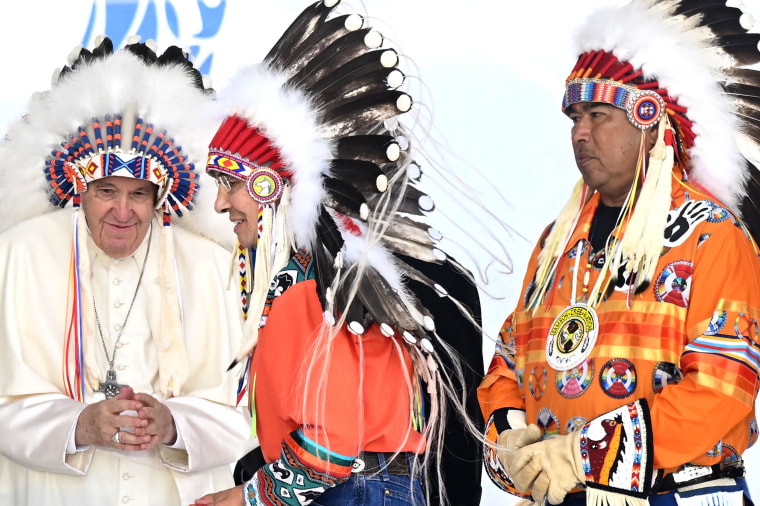Following a historic apology first given in Rome on April 1, Pope Francis told Indigenous survivors of Canada’s Indian Residential Schools he was “deeply sorry” and begged for their forgiveness for the “evil” done by Christians against Indigenous Peoples across this land.
About time.
But while it’s a welcome step, is this just a theatrical flaunting of the empire of the Catholic Church? Or is the pope truly ashamed and sorrowful for the sins the church committed against Indigenous children?
Is the pope truly ashamed and sorrowful for the sins the church committed against Indigenous children?
It has been seven years since Canada’s Truth and Reconciliation Commission called for the head of the Catholic Church to apologize for operating a network of what were essentially concentration camps for children.
And the pope didn’t try to minimize the seriousness of this era of darkness; he accurately called it a “deplorable evil.”
It’s vile and unfathomable that Native children were torn from their families and forced to live in houses of horrors where murder, death, abuse and neglect were inflicted upon them by an institution that claimed to represent a loving God.
“I think back on the stories you told how the policies of assimilation ended up systematically marginalizing the Indigenous peoples, how also, through the system of residential schools, your languages and cultures were denigrated and suppressed,” the pope said Monday. He sat on an elevated, all-white platform within the circular outdoor structure of the traditional powwow arbor, with ceremonially dressed chiefs of the four nations of Maskwacis in central Alberta seated next to him.
Even as he had canceled or postponed other plans, the 85-year-old pope, who uses a wheelchair, had seemed especially determined to make good on this commitment. And indeed, thousands of survivors and their families traveled from across Canada and the U.S. to hear his words. The crowd was very quiet — as if survivors were holding their breath after generations of waiting for this day of reckoning.
The intergenerational effects of the atrocities committed against the First Peoples of this land live on. They show up in the form of brokenness, adversity, suicide, impoverishment, inequality and extensive systemic racism. Survivors have expressed to me how their residential schools “broke their spirit.”
Winston Northwest, a 63-year-old Indian Day School survivor from Maskwacis, made a trip to visit his father’s grave days before the papal appearance. Winston was 11 years old when, he says, his father, a survivor of the Ermineskin Cree Nation Indian Residential School, drank himself to death. Winston believes the residential school killed his father. Breaking down in sobs, Winston described how he told his father it was finally time to heal, to forgive and, hopefully, to move on.
Other survivors are healing in different ways. Some ignored the pope; others celebrated his visit as a new beginning.
And this truly is a beginning, not an end. This truth, healing and reconciliation journey is a deeply personal experience for each and every survivor.
On Monday, I was less than 10 feet away from the pontiff when he stopped to pray on Ermineskin Cree Nation pavement in front of where the residential school once stood. There was even an electric fence that once lined the perimeter of the school to keep the children in — as if they were animals.
And yet, I wondered whether Pope Francis really gets it. Whether he really grasps the severity of what happened, the genocide that was committed against children. When he prayed, was he praying again for forgiveness? Was he asking for past sins to be pardoned?
And yet, I wondered whether Pope Francis really gets it. Whether he really grasps the severity of what happened.
Because while his apology seemed sincere, he left out the sexual abuse that has been widely reported in these institutions. Survivors reached out to me immediately, wondering whether there had been some kind of mistake. Without a true and full acknowledgment of the Catholic Church’s role in this abuse — all of the abuse — the “deplorable evil” of residential schools will linger. And that also means acknowledging the institutional guilt of the church, not just the guilt of its members.
“Despite the historic apology, the Holy Father’s statement has left a deep hole in the acknowledgment of the full role of the church in the residential school system by placing blame on individual members of the church,” Murray Sinclair, the former lead commissioner of the Truth and Reconciliation Commission, wrote in response.
The church also says it’s committed to taking concrete action to address outstanding grievances. When, where and how will this begin? There are allegations that perpetrators are still alive who have never been pursued or convicted for their crimes of abuse.
Will Pope Francis follow through with requests from Inuit leaders and survivors to persecute fugitive priest Johannes Rivoire, for example, who has been accused of sexually molesting Inuit children? Rivoire, who denies the allegations, has a Canadian warrant out for his arrest and is hiding out at a Catholic Church-run nursing home in France.
If he’s serious about his apology, Pope Francis should also rescind the genocidal Doctrine of Discovery.
This doctrine has been around for centuries, ever since Pope Alexander VI created a series of papal bulls to justify seizing Indigenous lands in the name of Christianity. European settlers labeled Indigenous territories “terra nullius,” or vacant land. And the doctrine’s legacy of violence land dispossession lives on.
Ultimately, the pope’s “pilgrimage of penance” is a good first step. This journey is heavy, and the burden just became a bit lighter. But this dark legacy of the church, and the horrifying reality of these schools, is more than a historical footnote. Apologies are good, but justice is better. And the victims of Canadian residential schools deserve both — even after the pontiff returns to Rome.
